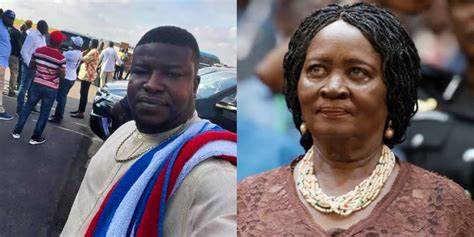The arrest and subsequent bail hearing of Mohammed Zakou, a New Patriotic Party (NPP) activist, highlights the complex intersection of free speech, political discourse, and the use of social media in contemporary society. Zakou’s case stems from a Facebook post containing the phrase “Rest Well Her Excellency” accompanied by crying emojis, which authorities interpreted as a false declaration of Vice President Naana Jane Opoku-Agyemang’s death. This incident underscores the potential for misinterpretation and the rapid spread of misinformation in the digital age, particularly when concerning public figures and sensitive topics like health and mortality. The case also raises questions about the role of law enforcement in regulating online speech and the balance between protecting individual expression and preventing the dissemination of false information that could incite public alarm or harm an individual’s reputation.
Zakou’s arrest on Saturday, April 12th, following the publication of the Facebook post, was prompted by public concern and the potential for the message to be misconstrued, especially given prior official reports confirming the Vice President’s ill health. This context is crucial in understanding the authorities’ swift response. The post, seemingly innocuous to some, was viewed as a deliberate attempt to spread false news regarding the Vice President’s well-being, potentially causing undue anxiety and confusion among the public. The timing of the post, in conjunction with pre-existing knowledge of the Vice President’s health status, likely contributed to the perception of malicious intent. This situation exemplifies the challenges faced by law enforcement in navigating the nuances of online communication and determining the line between protected speech and potentially harmful dissemination of false information.
The subsequent court proceedings shed further light on the intricacies of the case. During his appearance on Monday, April 14th, Zakou, represented by lead counsel Gary Nimako Marfo, applied for bail. The prosecution, while not opposing the bail application, emphasized the need for conditions to ensure Zakou’s cooperation with the ongoing investigation. This request suggests a desire to maintain a balance between upholding the accused’s rights while simultaneously pursuing a thorough investigation into the circumstances surrounding the Facebook post. The prosecution’s stance acknowledges the presumption of innocence while also reflecting the seriousness of the potential offense and the need to ensure accountability.
The court, after considering the arguments presented by both sides, granted Zakou bail in the sum of GHC 100,000 with two sureties. This decision reflects the court’s attempt to reconcile the competing interests at play: the accused’s right to liberty pending trial and the need to ensure his presence for future court proceedings and cooperation with the investigation. The substantial bail amount and the requirement of two sureties underline the court’s concern about the potential consequences of the alleged offense and the importance of securing Zakou’s compliance with the legal process. The additional condition requiring Zakou to report weekly to the investigator further reinforces the court’s emphasis on ensuring his active participation in the investigation.
The adjournment of the case to May 12, 2025, for a case management conference signifies the beginning of a potentially lengthy legal process. This extended timeframe allows both the prosecution and the defense ample time to gather evidence, interview witnesses, and prepare their respective cases. The case management conference will serve as a crucial juncture for the court to assess the progress of the investigation and establish a timeline for subsequent proceedings. This period will likely involve further scrutiny of the Facebook post, its intended meaning, and its potential impact on the public. The prosecution will need to demonstrate that Zakou’s actions met the legal threshold for publishing false news, while the defense will likely argue that the post was misinterpreted or that it fell within the realm of protected speech.
This case serves as a valuable case study in the ongoing debate surrounding online speech, political expression, and the role of social media in shaping public discourse. It raises fundamental questions about the boundaries of free speech in the digital age and the challenges faced by both law enforcement and the judiciary in regulating online communication. The outcome of this case will have significant implications for future interpretations of online speech regulations and could set a precedent for how similar incidents are handled. Furthermore, it underscores the importance of media literacy and critical thinking in an era of readily accessible information, reminding individuals to exercise caution and discernment when interpreting online content, especially concerning sensitive topics with potential societal ramifications.














